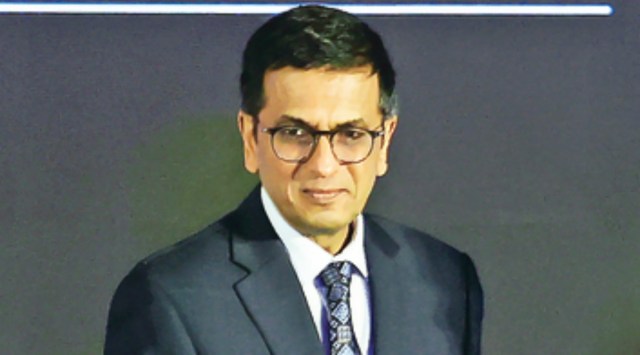THE SUPREME Court on Monday effectively stayed the transfer of a judge from the Armed Forces Tribunal’s (AFT) Chandigarh bench to Kolkata and directed the tribunal’s chairperson to submit in a sealed cover a report detailing why the transfer was effected.

It also wrote twice to Chief Justice of India D Y Chandrachud, terming the transfer as “a direct assault on the independence of judicial functioning” of the AFT. It alleged that Justice Chaudhary was transferred because “he refused to buckle under the pressure of the Ministry of Defence”.
Story continues below this ad
On Monday, a bench headed by CJI Chandrachud said that “pending further orders Justice Chaudhary shall not be required to assume charge at the regional bench at Kolkata”. It also directed that “the execution petitions which have been heard by the bench of the AFT at the regional bench at Chandigarh, shall presently not be disposed of without the leave of this court”.
The bench, also comprising Justices J B Pardiwala and Manoj Misra, said, “Ordinarily, this court is circumspect in interfering with orders involving transfer. In the present case, a member of the Armed Forces Tribunal who was posted at the regional bench in Chandigarh has been directed to be transferred to the regional bench in Kolkata. Bearing in mind the conventional wisdom by which the exercise of the power of judicial review in matters of transfer is subject to self-imposed restraints, it is necessary to notice the grievance of the AFT Bar Association.”
Noting the circumstances leading to the transfer, the bench said, “The transfer of a judicial officer in the circumstances which have been narrated… where he was dealing with applications of non-compliance of the directions of AFT with regard to the payment of disability pension will certainly merit close scrutiny.”
“The petitioners have submitted that the entire administrative control over the Armed Forces Tribunal together with the funding is under the supervision of the Ministry of Defence. The petitioners submit that the only respondent in proceedings before the AFT (apart from any competing service officers) is the Ministry of Defence. Hence, the building of administrative and functional control by the Ministry of Defence, it is urged, is contrary to the judgments of Constitution benches of this court,” the bench said.
Story continues below this ad
It directed that the AFT chairperson should inform the Supreme Court registrar by October 13 why the transfer was effected.
In its petition, the AFT Chandigarh Bar Association had alleged interference by the Ministry of Defence in the transfer of Justice Chaudhary because he had initiated contempt proceedings against a senior officer of the Defence Accounts Department for non-compliance of orders related to disability pension.
Arguing the matter for the Bar, senior advocate K Parmeshwar said that one prayer before the court was against the transfer order and the second was about the functioning of the tribunal. “This is a case where the facts speak for itself,” he said.
Parmeshwar contended that the AFT was being controlled by the Ministry of Defence. Referring to certain “covert decisions”, he claimed the tribunal said “please implement our orders” five times. “Six hundred applicants are stuck before the court because the ministry doesn’t implement orders,” he contended.
Story continues below this ad
In its letter to the CJI on September 26, the Bar alleged that after measures were taken to get the orders of the AFT executed, which had been lying unimplemented for many years, “the AFT chairperson first transferred the contempt proceedings from the Chandigarh bench to himself and then transferred the judicial member who was ensuring the compliance and adherence to the rule of law”. The chairperson also transferred the execution proceedings pending in other benches of the principal bench to his own bench, it claimed.
In a separate letter to the CJI on October 4, the Bar claimed that the Defence Minister had recently made certain comments at a public function of the Defence Accounts Department, giving rise to suspicion of direct interference by the ministry in the matter.
The Bar said in the letter that the transfer was neither acceptable to the lawyers nor litigants and had shaken the faith of the vast population of ex-servicemen, disabled ex-servicemen and widows, who constitute the majority of litigants before the tribunal.









